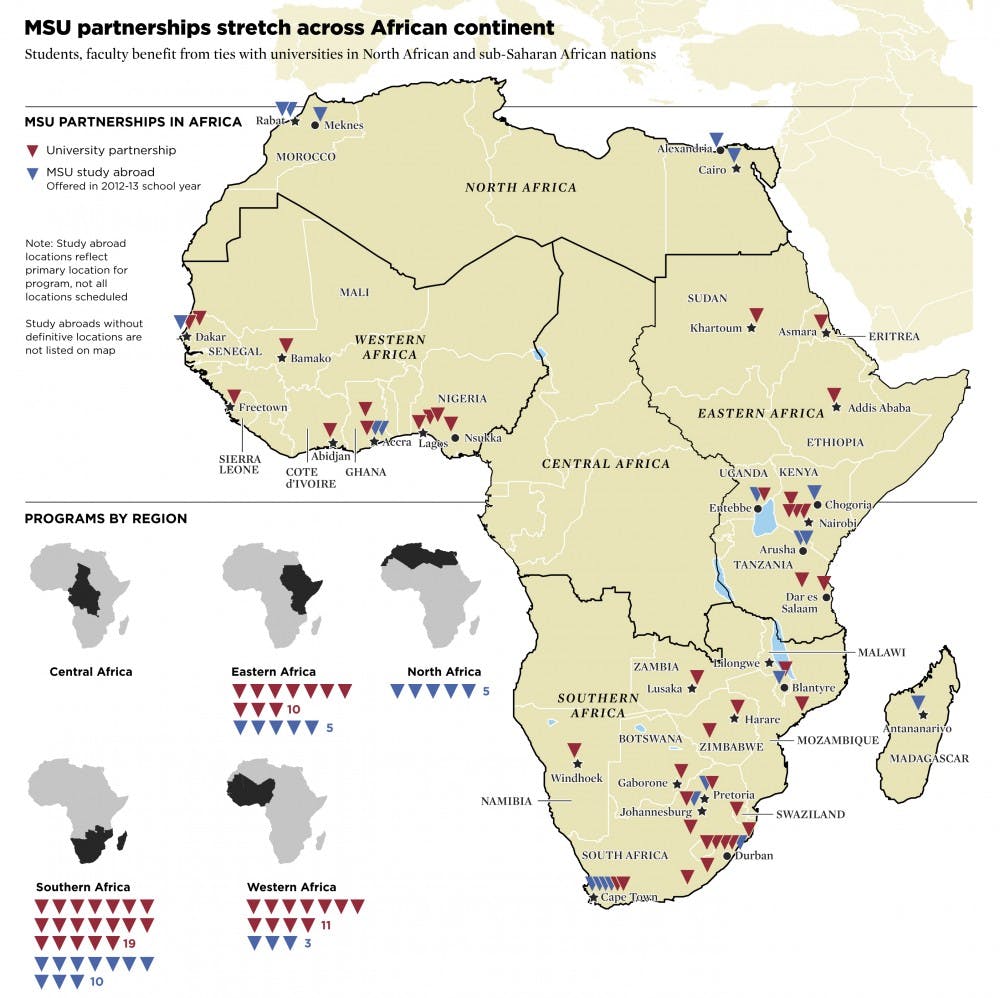In many ways, Zambia has shaped Melissa Elafros.
Whether it was during her first tour in the summer of 2008, when she cared for an ill, nonresponsive child in a Zambian hospital, or attending a wedding this year with a Zambian family she has come to consider her own, Elafros said she is connected to “the real Africa,” which is Zambia’s slogan.
She is a small part of a half-century-old African initiative that now has amassed more than $50 million in support in recent months.
This semester, MSU received a total of $52.8 million in grant money from the MasterCard Foundation Scholars Program and the Bill and Melinda Gates Foundation to help fund MSU’s African academic and research initiatives — with the grant from MasterCard being the largest cash commitment ever promised to the university.
The MasterCard Foundation is aiming to build on MSU’s mission, helping fund six African students’ degree pursuits this year in hopes they will return to their home countries with more knowledge and skills.
“Zambia and its people have claimed a piece of my heart,” Elafros said in an email from Zambia. “And I would be privileged to have the opportunity to return here to contribute.”
Elafros currently is working on doctoral research, specifically about HIV-related seizures and epilepsy at the University of Zambia’s University Teaching Hospital in Lusaka.
While her memory of the little boy keeps her humble and the family has made her feel like one of their own, it is the sense of community and hard work that she is honored to be a part of and drives her to continue striving to make a difference.
“The problems faced by Zambia are real, diseases (such as) HIV have a very significant impact here,” Elafros said in an email. “But the people are very capable of solving the problems they face when they have access (to) the resources they require.”
Since the 1960s, MSU has been committed to global engagement, allowing Elafros and many other MSU students and faculty members the opportunity to help people in under-resourced areas across Africa solve their problems.
World-grant mission
In recent years, MSU President Lou Anna K. Simon adjusted MSU’s mission as a land-grant to a “world-grant” university.
According to the African Studies Center, or ASC, MSU led the charge in 1960, when the university partnered with Nigerians and helped establish the first land-grant university in Africa: The University of Nigeria in Nsukka.
It was a commitment ASC Director James Pritchett described as transitioning its mission to help the problems within the state of Michigan to a mission to solve some of the world’s biggest problems, such as food access and adequate medical treatment.
Many of MSU’s endeavors involve helping impoverished, underprivileged and less-developed African areas.
Although MSU was not the first university to implement programs in Africa, the scale was by far “unprecedented,” Pritchett said.
Gretchen Birbeck, director of MSU’s International Neurological and Psychiatric Epidemiology Program, has spent six months of the year for nearly two decades in countries such Zambia and Malawi researching neurological disorders and aiding the nations in developing health care programs.
“You could combine Zambia, Zimbabwe and Malawi and those three countries combined with a rough estimate of 50 million (people) have fewer neurologists than there are at the neurology department at MSU,” Birbeck said.
Like any relationship, building trust takes time.
“(MSU) supports the infrastructures and the long-term commitment, and those (professionals) who want to do this work aren’t bouncing from partner to partner, from country to country,” Birbeck said.
Far-reaching efforts
MSU has more than 40 partnerships with African universities across the continent.
Support student media!
Please consider donating to The State News and help fund the future of journalism.
Some of MSU’s African initiatives include university partnerships, doctoral research and study abroad programs in countries, such as Nigeria, South Africa, Kenya and Tanzania, according to the ASC.
For example, the Food Security Group works in countries throughout the continent, aiding farmers in creating markets to distribute the food, or helping develop food security net systems to make produce more affordable for families, said John Staatz, a professor emeritus of agricultural, food and resource economics.
These programs range from providing and creating access to health care, as in Elafros’ case, to establishing agricultural advancement through programs such as the Food Security Group.
“I am encouraged by MSU’s initiatives because it represents a commitment to students like me who are eager to learn how to live and work in an international community,” Elafros said.
Africa’s next generation
The key to Africa’s future success is finding self-sustainability, Pritchett said.
Pritchett said this success will lie among its youth, and he hopes in the future that roles between MSU and Africa will be reversed.
“I would like to see African development be African-driven by African experts, not all of the experts coming from the West,” Pritchett said. “We have to build on training the next generation of African experts in agriculture (and) in health.”
This is biochemistry and molecular biology freshman Barbara Kotei’s dream: To one day become a doctor and return to Ghana, her native country.
Kotei is one of the MasterCard Foundation Scholars who received a scholarship to help fund her education here.
“I am very interested in the public health sector in Ghana,” Kotei said. “I believe this is an opportunity to enrich myself and learn more and go back to my country (to) give back in many ways.”
Timeline source: MSU African Studies Center
Discussion
Share and discuss “Continental Connection” on social media.







